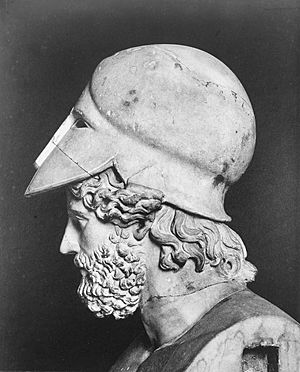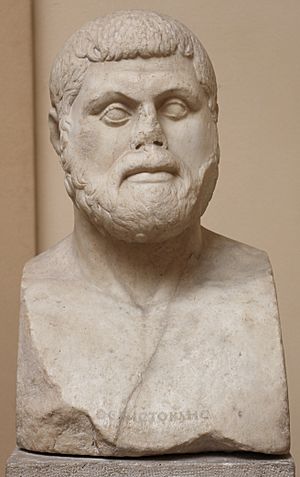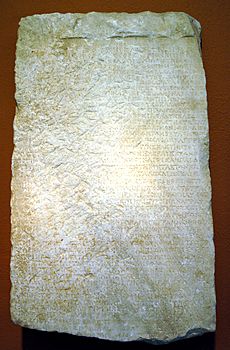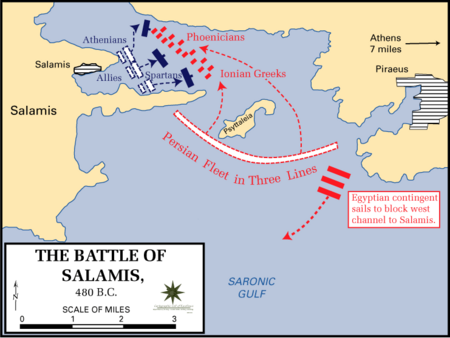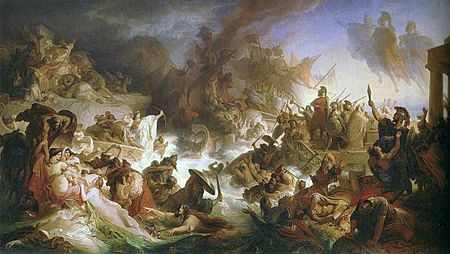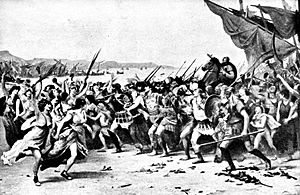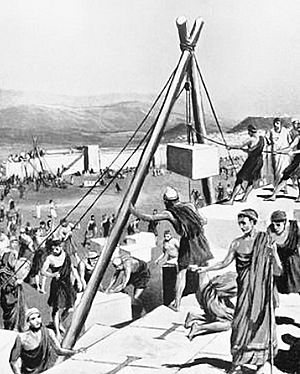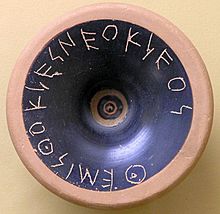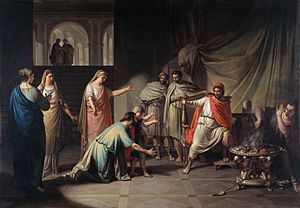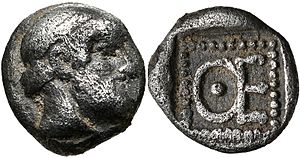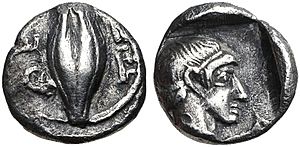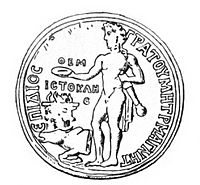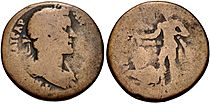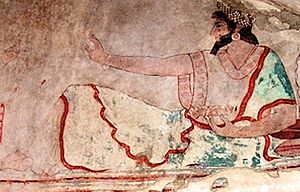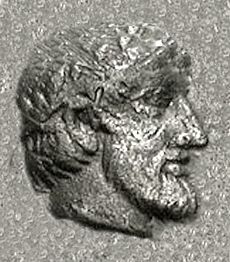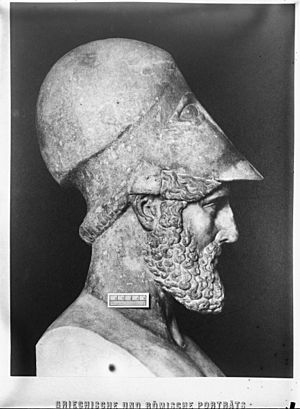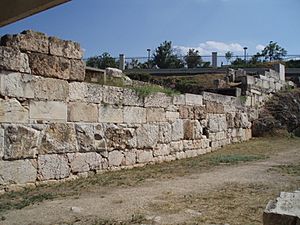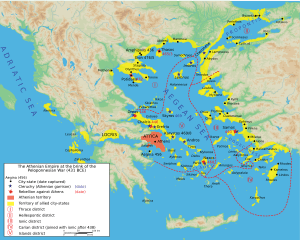Themistocles facts for kids
Quick facts for kids
Themistocles
|
|
|---|---|
| Θεμιστοκλῆς | |
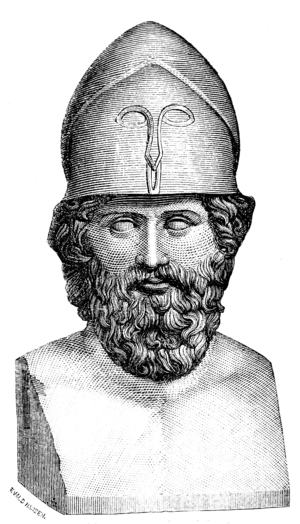
Herm of Themistocles (1875 illustration)
|
|
| Eponymous archon of Athens | |
| In office 493 – 492 BC |
|
| Preceded by | Pythocritus |
| Succeeded by | Diognetus |
| Governor of Magnesia | |
| In office 465 – 459 BC |
|
| Succeeded by | Archeptolis |
| Personal details | |
| Born | c. 524 BC Phrearrhii (modern-day Greece) |
| Died | c. 459 BC (aged 64–65) Magnesia on the Maeander (modern-day Tekin, Germencik, Aydın, Turkey) |
| Military service | |
| Allegiance | Athens (until 471 BC) |
| Rank | Strategos |
| Battles/wars |
|
Themistocles (born around 524 BC, died around 459 BC) was a famous Athenian politician and general. He was one of the first important leaders who didn't come from a noble family in the early days of Athenian democracy. Themistocles was popular with ordinary Athenians and often disagreed with the rich and powerful families.
In 493 BC, he was elected as an important leader called an archon. He convinced the city of Athens to build a stronger navy, which became a key part of his career. During the First Persian invasion of Greece, he fought in the Battle of Marathon in 490 BC. He might have been one of the ten Athenian generals (called strategoi) in that battle.
After the Battle of Marathon, Themistocles became the most important politician in Athens. This was before the Second Persian invasion of Greece in 480–479 BC. He kept pushing for a strong Athenian Navy. In 483 BC, he persuaded the Athenians to build a fleet of 200 triremes (fast warships). These ships were super important in the upcoming war with Persia.
During the second invasion, Themistocles was the main leader of the Greek allied navy. He led them in the battles of Artemisium and Salamis in 480 BC. Thanks to his clever plans, the Greek forces tricked the Persian fleet into the narrow Straits of Salamis. The Greeks won a huge victory there, which changed the course of the war. The Persian invasion was finally stopped the next year after their defeat on land at the Battle of Plataea.
After the war, Themistocles remained a leading figure in Athens. However, he made Sparta angry by ordering Athens to rebuild its city walls. His growing pride also started to upset the Athenians. In 472 or 471 BC, he was ostracised, meaning he was exiled from Athens for ten years. He went to live in Argos.
The Spartans then tried to link Themistocles to a supposed plot by their own general, Pausanias. So, Themistocles had to flee from southern Greece. Alexander I of Macedon gave him a safe place to stay for a short time. Then, Themistocles traveled to Asia Minor and began working for the Persian king Artaxerxes I. He was made governor of Magnesia and lived there for the rest of his life.
Themistocles died in 459 BC, likely from natural causes. After his death, his reputation improved, and he was seen again as a hero of Athens and Greece. Many people, like the ancient writer Plutarch, believe Themistocles was "the man most instrumental in achieving the salvation of Greece" from the Persian threat. His naval policies also had a lasting impact on Athens. Sea power became the foundation of the Athenian Empire and its golden age. The historian Thucydides described Themistocles as a person with amazing natural talent and genius.
Contents
Themistocles's Early Life and Family
Themistocles was born in a part of Athens called Phrearrhioi around 524 BC. His father was Neocles, who was not a very famous person in Athens. His mother's background is less clear, but she might have been from a different region. Because of his mother's background, some people saw Themistocles as an outsider. His family lived in a part of Athens where many immigrants lived.
Even as a child, Themistocles was interested in public life. He wanted to prepare himself to be a leader. He had several children. His sons included Archeptolis, Polyeuctus, and Cleophantus. He also had older sons, Neocles and Diocles. Themistocles had many daughters, including Mnesiptolema, Italia, Sybaris, Nicomache, and Asia.
Becoming a Leader in Athens
Themistocles grew up during a time of big changes in Athens. The city had been ruled by a tyrant named Hippias. But in 510 BC, the Spartans helped overthrow Hippias. After this, a leader named Cleisthenes suggested a new way of governing where power would be with the people. This was the start of "democracy" in Athens.
This new system gave people like Themistocles, who weren't from noble families, a chance to gain power. Themistocles was very good at this new system. He knew how to get things done, make connections, and get noticed. He moved to a less wealthy part of Athens, which helped him connect with ordinary citizens. He also started practicing law, which was a new way to prepare for public life. His skills as a lawyer and problem-solver made him even more popular.
Themistocles as Archon
Around 494 BC, Themistocles turned 30, which meant he could become an archon. Because he was so popular, he was elected Archon Eponymous, the highest government job, in 493 BC. During his time as archon, Themistocles began to focus on a major goal: making Athens a powerful sea nation.
He guided the Athenians to start building a new port at Piraeus. This new port was further from Athens but had three natural harbors that were easy to defend. Athens would become a major sea power in the 5th century BC, so Themistocles's plans were very important for the future of Athens and all of Greece. By building up the navy, Themistocles was also giving more power to the common citizens who served as rowers on the ships.
Rivalry with Aristides
After the Battle of Marathon, another hero, Miltiades, was injured and then put on trial by powerful families. This was common among the rich families in Athens who didn't want one person to become too powerful. Miltiades died soon after.
After Miltiades's death, Themistocles became the most important politician in Athens. However, the noble families started to support his rival, Aristides. Aristides was known for being honest and fair, and his followers called him "the just."
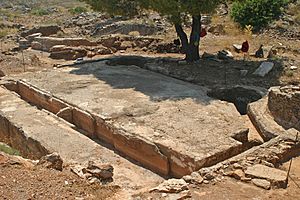
During this time, Themistocles kept pushing for a stronger Athenian navy. The Athenians knew that Persia was still interested in Greece. Themistocles seemed to understand that Greece needed a strong navy to face the powerful Persian fleet. He tried to convince the Athenians to build more ships. Aristides, however, was against this plan.
In 483 BC, a huge new amount of silver was found in the Athenian mines at Laurium. Themistocles suggested using this silver to build 200 new triremes. Aristides thought the silver should be given to the Athenian citizens instead. Themistocles didn't mention Persia directly. Instead, he focused on their ongoing war with Aegina, saying a new fleet would help them defeat Aegina at sea.
Themistocles's plan was approved, though only 100 warships were initially planned. Aristides still disagreed. The tension between them grew, leading to an "ostracism" vote in 482 BC. In this vote, citizens wrote the name of a politician they wanted to exile for ten years. Aristides was ostracized, and Themistocles's naval plans were fully supported. The Athenians even voted to build more ships than Themistocles had first asked for, as they realized the Persian invasion was coming. Themistocles became the leading politician in Athens before the invasion.
The Second Persian Invasion of Greece
In 481 BC, Greek city-states met and agreed to form an alliance against the coming Persian invasion. Sparta and Athens were the most important members. The Spartans led the land forces. Themistocles wanted to lead the navy, but other naval powers like Corinth and Aegina refused. So, the Spartans, who weren't strong at sea, were given command of the navy as a compromise. However, it was clear that Themistocles was the real leader of the fleet.
The Greeks first tried to block the Persian army at the Vale of Tempe. But they learned that the Persians could go around it, so they retreated.
Themistocles then came up with a new plan. The Persian army would have to pass through the very narrow Thermopylae pass to reach southern Greece. The Greek soldiers could block this pass. To stop the Persians from going around by sea, the Greek navies could block the Straits of Artemisium. But the Spartans were hesitant to leave their home again.
To convince the Spartans, Themistocles had to show that Athens was fully committed. This meant sending the entire Athenian fleet to Artemisium. To do this, every able-bodied Athenian man had to serve on the ships. This also meant that Athenians had to leave their city. Themistocles convinced the Athenians to send their women and children to the safe city of Troezen in southern Greece. With the Athenian fleet ready, the other Greek allies agreed to his plan.
Battle of Artemisium
In August 480 BC, the Greek fleet sailed to Artemisium, and the army went to Thermopylae. Themistocles led the Athenian ships at Artemisium. When the Persian fleet arrived, the main Greek commander, Eurybiades, wanted to leave. Themistocles took a large bribe from local people to keep the fleet there. He used some of it to bribe Eurybiades to stay, keeping the rest for himself. From then on, Themistocles was largely in charge of the Greek efforts at Artemisium.
For three days, the Greeks fought well against the much larger Persian fleet, but they lost many ships. When they heard that the land battle at Battle of Thermopylae was lost, the Greek fleet left Artemisium. Themistocles reportedly left messages for the Ionian Greeks in the Persian fleet, asking them to switch sides or fight poorly. He hoped this would make the Persian king, Xerxes, suspect the Ionians and cause problems in his army.
Battle of Salamis
After Thermopylae, the Persians took over Boeotia and marched towards Athens. The Greek allies from southern Greece prepared to defend the Isthmus of Corinth, leaving Athens to the Persians. From Artemisium, the Greek fleet sailed to Salamis. The Athenian ships helped evacuate the last people from Athens.
The allies from southern Greece wanted to move the fleet closer to the Isthmus to join the army. But Themistocles tried to convince them to stay in the Straits of Salamis. He argued that fighting in narrow spaces would help the smaller Greek fleet. He even threatened to take all the Athenians and sail to Sicily if they didn't agree. Since the other allies depended on the Athenian navy, they eventually agreed to his plan. Even after Athens fell to the Persians, the Greek navy stayed in the Straits of Salamis. Themistocles wanted to fight a battle that would cripple the Persian navy and protect southern Greece.
To make the Persians fight, Themistocles used a clever trick. He sent a servant to Xerxes, pretending to be on the Persian side. The servant told Xerxes that the Greek commanders were fighting among themselves and that the southern Greeks planned to leave that night. He said that if the Persians blocked the straits, they would win easily. Themistocles wanted to lure the Persian fleet into the narrow Straits. This message also had a backup plan: if the Greeks lost, the Athenians might get better treatment from Xerxes because they had shown a willingness to surrender.
Xerxes believed the message and sent his fleet to block the straits. The Persian navy, perhaps overconfident, sailed into the narrow Straits. They found that the Greek navy was ready for battle, not falling apart.
According to the historian Herodotus, Aristides, Themistocles's rival, arrived at the Greek camp. Themistocles had called him back from exile so Athens could be united against the Persians. Aristides told Themistocles that the Persian fleet had surrounded the Greeks. Themistocles was very happy because he knew his trap had worked. The Greek commanders seemed to accept this news calmly, suggesting they might have known about Themistocles's trick all along.
The Greeks prepared for battle, and Themistocles gave a speech to his sailors. In the battle that followed, the narrow conditions in the Straits confused the much larger Persian navy. The Greek forces took advantage and won a famous victory.
Salamis was the turning point of the second Persian invasion and the Greco-Persian Wars. While it didn't end the invasion immediately, it ensured that Greece would not be fully conquered. It allowed the Greeks to go on the attack in 479 BC. Many historians believe Salamis is one of the most important battles in history. Because Themistocles had pushed for a strong Athenian navy for so long, and his clever plan led to the Battle of Salamis, it's fair to say he was crucial in saving Greece.
After Salamis (480/479 BC)
The Greek victory at Salamis removed the immediate threat to Greece. Xerxes returned to Asia with part of his army, leaving his general Mardonius to continue the conquest. The Athenians were able to return to their city, which the Persians had burned, for the winter.
During the winter, the Greek allies met to celebrate their success. However, they didn't give Themistocles the top prize for individual achievement. Perhaps they were tired of the Athenians boasting about their role at Salamis. The Spartans, realizing how important the Athenian fleet was, invited Themistocles to Sparta. There, he received a special prize for his "wisdom and cleverness" and was highly praised.
Spring/Summer 479 BC
However, like many successful people in Athenian democracy, Themistocles's fellow citizens became jealous. It's likely that in early 479 BC, Themistocles lost his command. Instead, Xanthippus led the Athenian fleet, and Aristides led the land forces. Themistocles was still active, but his actions aren't mentioned much in ancient writings for this year.
In the summer of 479 BC, the Greeks finally agreed to gather an army and fight Mardonius, who had reoccupied Athens. At the decisive Battle of Plataea, the Greeks destroyed the Persian army. On the same day, the Greek navy destroyed the remaining Persian fleet at the Battle of Mycale. These two victories completed the Greek triumph and ended the Persian threat.
Rebuilding Athens and Later Life
Whatever caused Themistocles's unpopularity in 479 BC, it didn't last long. He quickly regained the favor of the Athenians. After 479 BC, he was popular for a long time.
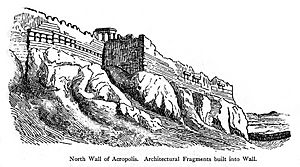
After the Persian invasion, the Athenians began rebuilding their city in the autumn of 479 BC, guided by Themistocles. They wanted to rebuild Athens's walls, but the Spartans objected. They didn't want any strong fortresses north of the Isthmus that the Persians could use. Themistocles told the Athenians to build the walls as fast as possible. Then, he went to Sparta as an ambassador to answer their complaints.
In Sparta, he pretended that no building was happening and told them to send their own messengers to Athens to see. By the time the Spartan messengers arrived, the Athenians had finished building the walls. Themistocles then held the Spartan messengers when they complained. This delay gave Athens enough time to fortify the city and prevent any Spartan attack aimed at stopping the rebuilding. The Spartans had to send Themistocles back to Athens to free their own messengers. This event, however, might have been the start of Sparta's mistrust of Themistocles.
Themistocles also returned to his naval plans, aiming to make Athens the most powerful sea nation. He expanded and fortified the port at Piraeus even more. He wanted Athens to be the dominant naval power in the Aegean Sea. In 478 BC, Athens formed the Delian League, an alliance of naval powers under Athenian leadership. Themistocles also encouraged tax breaks for merchants and craftspeople to attract people and trade to Athens, making it a major trading center. He also ordered the Athenians to build 20 triremes every year to keep their naval strength.
Themistocles's Exile
Towards the end of this period, Themistocles started to make enemies. He also became arrogant, and his fellow citizens grew jealous of his fame and power. The Spartans actively worked against him, trying to promote Cimon as a rival. After the Spartan general Pausanias was disgraced, the Spartans tried to involve Themistocles in his supposed plot. However, Themistocles was found innocent of these charges.
In Athens, he lost favor by building a temple to Artemis near his home, calling her "of good counsel." This was a clear reference to his own role in saving Greece from the Persians. Finally, in either 472 or 471 BC, he was ostracised again.
Themistocles first went to live in Argos. But the Spartans saw a chance to finally get rid of him. They again accused him of being involved in Pausanias's treason. They demanded he be tried by all the Greek states. Realizing he had little hope of surviving a trial, Themistocles fled. He went first to Kerkyra and then to Admetus, the king of Molossia.
Themistocles's escape probably convinced his accusers that he was guilty. He was declared a traitor in Athens, and his property was taken away. Many historians believe the charges were false and only made to destroy Themistocles. The Spartans sent messengers to Admetus, threatening war if he didn't hand over Themistocles. But Admetus helped Themistocles escape, giving him money for his journey. Themistocles then left Greece, never to return, ending his political career.
Life in the Persian Empire and Death
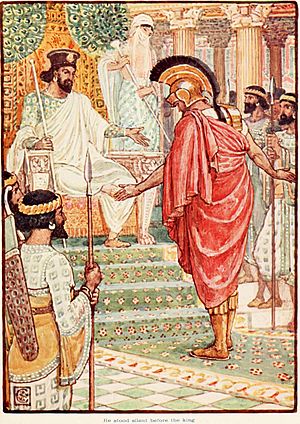
From Molossia, Themistocles sailed to Asia Minor. After some adventures, he eventually contacted the Persian king, Artaxerxes I. Themistocles asked for a year to learn the Persian language and customs before serving the king. Artaxerxes agreed. The king was very happy that such a dangerous and famous enemy had come to serve him.
Themistocles's wife and children were later brought out of Athens by a friend and joined him in exile. His friends also sent him many of his belongings, though some of his wealth was taken by the Athenians. When Themistocles returned to the king's court after a year, he made a strong impression. He gained great respect, more than any other Greek before or since. He advised the king on dealing with the Greeks.
Themistocles was made governor of the region of Magnesia in Asia Minor. He received income from three cities: Magnesia (for food), Myus (for side dishes), and Lampsacus (for wine). Other sources say he also received income from two more cities for clothes and furniture.
Greek Exiles in Persia
Themistocles was one of several Greek nobles who found safety in the Achaemenid Empire after problems in their home cities. Other famous ones included Hippias and Alcibiades. The Persian kings usually welcomed them generously, giving them land and allowing them to rule various cities in Asia Minor.
First Ruler on Coins
Coins are some of the only original documents from Themistocles's time. While early coins showed gods or symbols, the first coins with actual rulers' portraits appeared in the 5th century BC. Themistocles was probably the first ruler to put his own portrait on coins when he was governor of Magnesia (465–459 BC). He might have been in a unique position to combine the Greek idea of individual portraits with the Persian power to issue his own coins. However, some people think the portraits on his coins might be of Zeus instead of him.
Themistocles is known to have built two statues of himself, one in Athens and one in Magnesia. This makes it more likely that he also put his image on his coins. The statue in Magnesia was even shown on the back of some coins made by the Roman Emperor Antoninus Pius in the 2nd century AD.
After Themistocles, rulers in Lycia started putting their portraits on coins. From the time of Alexander the Great, it became common for rulers to have their portraits on coins.
Themistocles's Death
Themistocles died in Magnesia in 459 BC, at about 65 years old. The historian Thucydides says he died of natural causes.
It was rumored that after his death, Themistocles's bones were secretly brought back to Athens and buried there, as it was illegal to bury an Athenian traitor in Athens. The people of Magnesia built a beautiful tomb for Themistocles in their marketplace, which was still standing in Plutarch's time. They also continued to give part of their income to Themistocles's family.
His Children and Descendants
Archeptolis, Themistocles's son, became Governor of Magnesia after his father's death around 459 BC. Archeptolis also made his own silver coins. Themistocles and his son created what some historians call "a Greek dynasty in the Persian Empire."
Themistocles also had other children who lived in Asia Minor. Later, some of Themistocles's sons seem to have returned to Athens. They dedicated a painting of Themistocles in the Parthenon and a bronze statue on the Acropolis.
Even 600 years later, in the 1st century AD, the writer Plutarch met a direct descendant of Themistocles in Athens who was still receiving income from Asia Minor.
What People Thought of Themistocles
His Character
We can learn a lot about Themistocles's personality. He was incredibly ambitious and always wanted to be in public office. He was proud and wanted recognition for his actions. While he wanted the best for Athens, many of his actions also seemed to be for his own benefit. He was also known for accepting bribes.
However, despite these flaws, he had amazing natural talent and leadership skills: "Themistocles was a man who showed clear signs of genius. He was incredibly good at making quick decisions in emergencies and predicting the future, even far ahead. He was also great at explaining his ideas and judging things he had no experience with. Overall, he was an extraordinary man who surpassed everyone else in his ability to handle unexpected situations."
Both Herodotus and Plato tell a story where Themistocles cleverly responded to a man who complained that Themistocles was only famous because he was from Athens. Themistocles replied that if he had been from a small, unimportant island, he wouldn't have been honored, but neither would the other man, even if he was from Athens.
Themistocles was very intelligent and also very cunning. He was sociable and had strong loyalty from his friends. It seems that his unique mix of good and bad traits made him such an effective politician.
His Historical Reputation
Themistocles died with a damaged reputation, seen as a traitor to Athens. But his reputation in Athens was later restored. By the time Herodotus wrote his history, Themistocles was again seen as a hero. Thucydides also admired Themistocles greatly. Diodorus praised Themistocles extensively, saying his great ability should not go unrecorded. Plutarch offered a more balanced view, acknowledging Themistocles's achievements but also his flaws.
His Impact on History
Without a doubt, Themistocles's greatest achievement was his role in defeating Xerxes's invasion of Greece. Against huge odds, Greece survived, and its classical culture, which greatly influenced Western civilization, was able to grow.
Themistocles's idea of Athenian naval power and making Athens a major power in Greece had a huge impact in the 5th century BC. In 478 BC, the Greek alliance was reformed into the Delian League, with Athens as the dominant power. This was a sea alliance that took the war to Persia and eventually controlled the Aegean Sea. Under Pericles, the Delian League slowly became the Athenian Empire, the peak of Athens's power.
Themistocles seemed to deliberately set Athens up as a rival to Sparta after the Persian invasion, basing Athens's power on its navy (compared to Sparta's army). Tension grew between Athens and Sparta throughout the century as they competed to be the leading state in Greece. This tension eventually led to the Peloponnesian War in 431 BC, a series of conflicts that tore Greece apart for the next century. This was an unexpected, though indirect, result of Themistocles's actions.
Modern scholars see Themistocles as a great leader and strategist who changed his city to achieve naval victory.
In 1851, a botanist named Johann Friedrich Klotzsch named a genus of flowering plants from South America Themistoclesia in honor of Themistocles.
See also
 In Spanish: Temístocles para niños
In Spanish: Temístocles para niños
 | Delilah Pierce |
 | Gordon Parks |
 | Augusta Savage |
 | Charles Ethan Porter |


